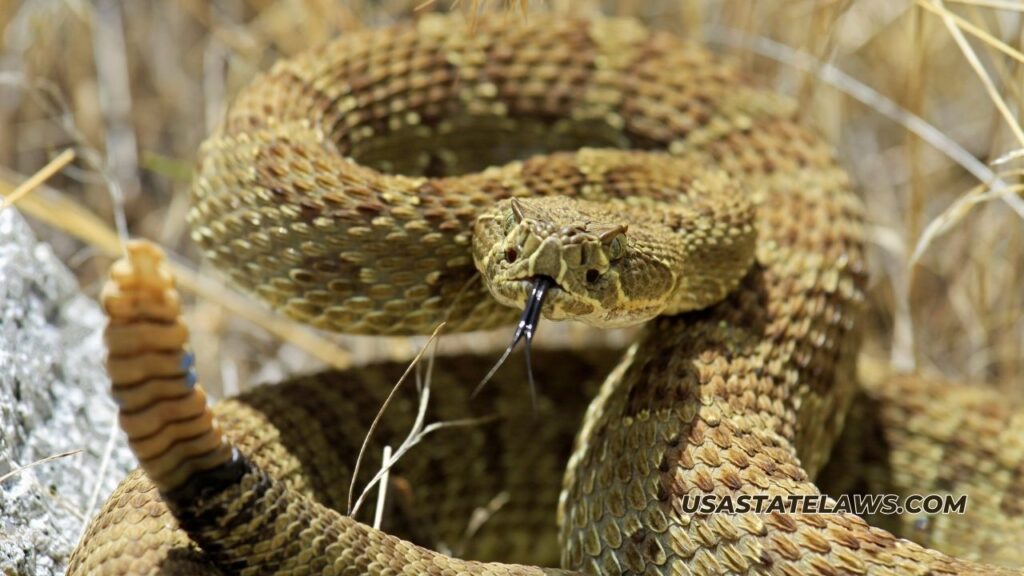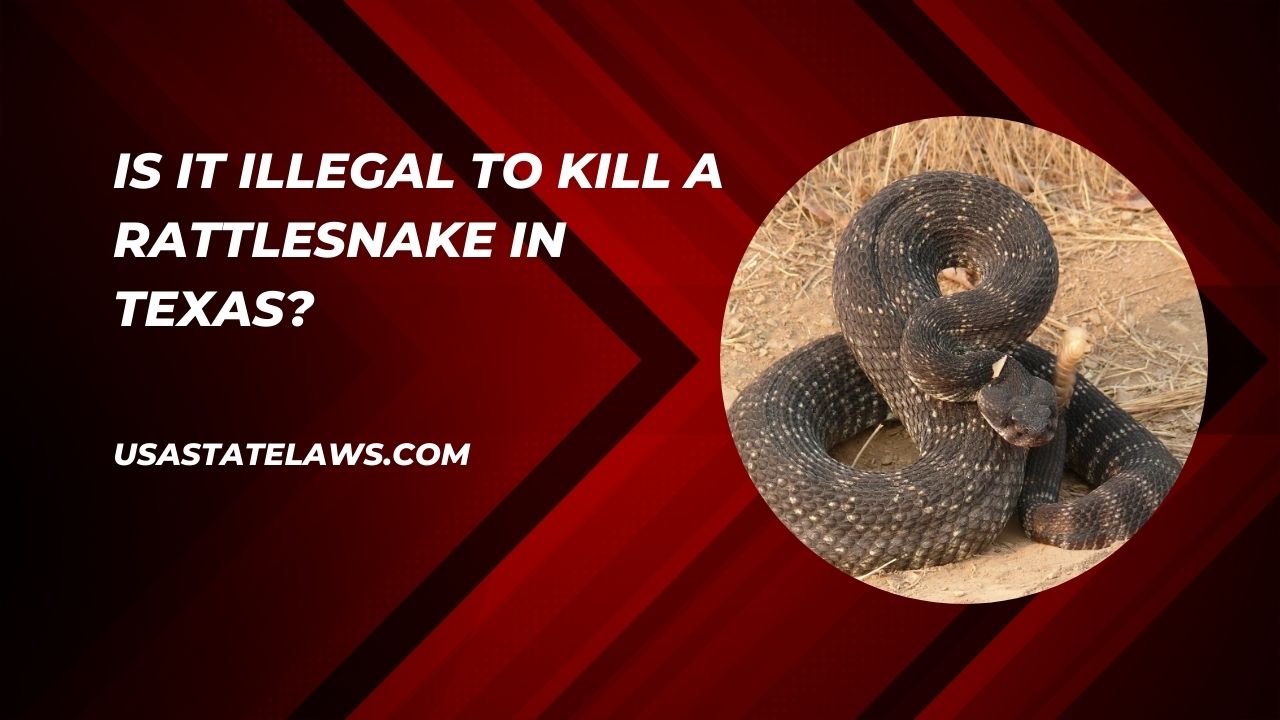Is It Illegal To Kill A Rattlesnake In Texas? In Texas, it is generally legal to kill a rattlesnake, especially if it poses a threat.
Rattlesnakes are one of the most feared creatures in Texas. Their distinctive rattle is often enough to send shivers down anyone’s spine, signaling potential danger.
Given their venomous nature, many Texans find themselves asking a crucial question: Is it illegal to kill a rattlesnake in Texas?
This blog post will explore the laws surrounding killing rattlesnakes, as well as ways to handle encounters with these snakes safely.
Contents
What Are Rattlesnakes?
Description of Rattlesnakes
Rattlesnakes are a venomous group of snakes found in the Americas, recognized for the distinctive rattle on their tails, which they shake to warn off both predators and humans.
They can range in size from less than two feet to over seven feet in length, depending on the species.
Rattlesnakes come in a variety of colors and patterns, typically designed to help them camouflage with their environment, making them hard to detect until they perceive a threat.
Rattlesnakes rely on their venom to immobilize prey, which mainly consists of small mammals, birds, and lizards. Although a rattlesnake bite can pose serious risks to humans, fatalities are uncommon due to the availability of modern medical treatments and antivenom.
Still, their bites can cause severe pain, tissue damage, and long-term complications if not treated promptly. [Is It Illegal To Kill A Rattlesnake In Texas?]
Texas is the house to numerous types of rattlesnakes, including:
- Western Diamondback Rattlesnake: The most common species found in Texas.
- Prairie Rattlesnake: Found mainly in the state’s western regions.
- Timber Rattlesnake: A protected species in Texas.
- Mojave Rattlesnake: Known for its potent venom, found in the desert regions.
Rattlesnakes in the Texas Ecosystem
Rattlesnakes play a crucial role in Texas ecosystems. They help control populations of small animals such as rodents, which are known to damage crops and spread disease.
Without predators like rattlesnakes, the ecosystem could fall out of balance, leading to increased pest populations and potential economic consequences for farmers and ranchers.
Rattlesnakes are also a food source for other wildlife, such as birds of prey, larger mammals, and other snake species. [Is It Illegal To Kill A Rattlesnake In Texas?]
As such, they are an important link in the food chain and contribute to maintaining biodiversity in the region.
Is It Illegal To Kill A Rattlesnake In Texas?
General Legal Stance
In Texas, killing a rattlesnake is generally legal, especially if the snake poses a threat to humans, pets, or livestock. [Is It Illegal To Kill A Rattlesnake In Texas?]
This means that if you encounter a rattlesnake on your property or in a place where it could endanger lives, you are within your legal rights to kill it.
Texas does not have blanket protections for rattlesnakes, unlike some states that strictly regulate interactions with native wildlife.
However, it is always wise to check for local regulations or ordinances, as certain counties or municipalities may have their own rules about wildlife protection.
In general, though, rattlesnakes do not fall under Texas’ more stringent wildlife protection laws unless they belong to a specific protected species.
Protected Rattlesnake Species
While it is legal to kill most rattlesnakes, certain species are protected under Texas law. One such species is the Timber Rattlesnake.
The Timber Rattlesnake is listed as a threatened species in Texas, making it illegal to kill, capture, or harm them unless they present an immediate danger to human life or property.
This protection is due to their declining population caused by habitat loss, human persecution, and other environmental factors.
If you kill a protected species like the Timber Rattlesnake, you may face hefty fines and legal penalties. It’s crucial to identify the rattlesnake species before taking any action.
If you’re unsure about the species you’ve encountered, it’s best to contact local wildlife authorities for guidance.

Exceptions to the Law
Although killing protected species is generally illegal, there are some exceptions to this rule. Texas law allows for the killing of rattlesnakes if they pose an immediate danger.
For instance, if a Timber Rattlesnake is threatening your life, your family, or your livestock, the law permits you to kill it in self-defense. [Is It Illegal To Kill A Rattlesnake In Texas?]
However, this exception only applies in situations where there is a clear and present danger. Killing a protected rattlesnake out of fear or without proper justification can still result in legal consequences.
Hunting Licenses and Permits
If you wish to hunt rattlesnakes for sport or other reasons, you will need a Texas hunting license. This license is required for hunting most wildlife in Texas, including non-protected rattlesnakes.
Texas also holds annual rattlesnake roundups, where hunters and enthusiasts gather to capture and kill rattlesnakes.
These events, while controversial, remain legal in the state, but participants must adhere to specific regulations, including obtaining the necessary permits.
It’s important to note that hunting licenses and permits are not required if you are killing a rattlesnake in self-defense or to protect your property.
However, if you plan on capturing or killing rattlesnakes recreationally, you must follow the proper legal channels. [Is It Illegal To Kill A Rattlesnake In Texas?]
Why Some Rattlesnakes Are Protected in Texas
Conservation Efforts
Texas has implemented conservation efforts to protect certain rattlesnake species, particularly those at risk of becoming endangered.
Habitat destruction, urbanization, and human conflict have reduced the populations of species like the Timber Rattlesnake, making it necessary to enact protections to prevent their extinction.
Conservationists emphasize the importance of these species in maintaining healthy ecosystems.
Rattlesnakes play a role in controlling rodent populations, which helps reduce the spread of diseases like Lyme disease, as ticks that carry the disease often feed on rodents.
Therefore, the loss of rattlesnakes could have broader impacts on public health and agriculture. [Is It Illegal To Kill A Rattlesnake In Texas?]
Endangered Species Regulations
Texas Parks and Wildlife regulates the protection of endangered and threatened species, including the Timber Rattlesnake.
These regulations are part of larger conservation efforts aimed at preserving biodiversity and ensuring that future generations can coexist with native wildlife.
These laws make it illegal to harm or kill protected species, including venomous ones. Violations can lead to fines, imprisonment, or other legal penalties.
The state encourages residents to contact wildlife experts if they encounter a protected species to avoid breaking the law.
Are There Alternatives To Killing Rattlesnakes?
Relocation Services
Rather than killing a rattlesnake, there are more humane alternatives, such as contacting local wildlife removal or relocation services. [Is It Illegal To Kill A Rattlesnake In Texas?]
These professionals can safely capture and relocate the snake to a more appropriate habitat, reducing the risk to both the snake and humans.
Relocating the snake also helps preserve its role in the ecosystem. Many wildlife experts believe that coexistence, rather than elimination, is a more sustainable approach to managing rattlesnake populations.
Safety Precautions
If you live in an area where rattlesnakes are common, there are several steps you can take to reduce the likelihood of encountering one on your property:
- Clear yard debris: Rattlesnakes often hide in piles of wood, leaves, or other debris. Keeping your yard tidy can minimize hiding places for them.
- Seal entry points: Check your home for small gaps or openings where rattlesnakes could enter. Snakes can squeeze through surprisingly small spaces.
- Secure food sources: Rodents are a primary food source for rattlesnakes, so keeping your home free of rodents will help reduce the chances of attracting snakes.
- Install snake-proof fencing: Specially designed fencing can prevent rattlesnakes from entering your property.
Taking these precautions can significantly reduce the risk of encountering rattlesnakes and prevent potentially dangerous situations.
What To Do If You Encounter A Rattlesnake
If you encounter a rattlesnake, remain calm and slowly back away from the snake. Rattlesnakes generally only bite in self-defense and prefer to avoid human interaction.
If the snake is in a location where it poses a danger to people or pets, contact local animal control or a wildlife removal service to safely remove it. [Is It Illegal To Kill A Rattlesnake In Texas?]
Attempting to kill the snake yourself can be risky, as rattlesnakes can strike quickly and unpredictably. If you’re not trained in handling venomous snakes, it’s safer to leave the job to professionals.
Final Verdict
In Texas, it is generally legal to kill a rattlesnake if it poses a threat to human life or property. However, some species, like the Timber Rattlesnake, are protected by law, and killing them without proper cause can result in fines and other penalties.
If you’re unsure whether the rattlesnake you encounter is a protected species, it’s best to err on the side of caution and contact wildlife authorities for assistance.
Killing rattlesnakes should be a last resort, as there are safer and more humane alternatives, such as relocation. [Is It Illegal To Kill A Rattlesnake In Texas?]
Taking steps to prevent encounters in the first place, such as securing food sources and keeping your yard clear, can help you avoid dangerous situations.
See Also: Are Squatted Trucks Illegal In Texas?
FAQs
Are all rattlesnakes protected in Texas?
No, only certain species, such as the Timber Rattlesnake, are protected under Texas law. Most other species can be killed legally if they pose a threat.
What should I do if I find a rattlesnake in my backyard?
If the rattlesnake is a threat, you are legally allowed to kill it. However, contacting local wildlife services to safely relocate the snake is a more humane option.
Can I kill a rattlesnake without a permit?
Yes, you can kill a rattlesnake without a permit if it is not a protected species and poses an immediate threat. A hunting license is required for recreational hunting of non-threatened species.
What are the penalties for killing a protected rattlesnake in Texas?
Penalties can include fines and legal action if you kill a protected species, such as the Timber Rattlesnake, without justification. [Is It Illegal To Kill A Rattlesnake In Texas?]
How can I safely avoid rattlesnakes in Texas?
Keep your yard clean, secure food sources, and consider installing snake-proof fencing to reduce the risk of rattlesnakes entering your property.
Conclusion: Is It Illegal To Kill A Rattlesnake In Texas?
While Texas law generally permits the killing of rattlesnakes, it’s important to be aware of the species you encounter.
Some, like the Timber Rattlesnake, are protected by state law and can only be killed under specific circumstances.
For the sake of safety and conservation, it’s often better to seek professional assistance when dealing with rattlesnakes. [Is It Illegal To Kill A Rattlesnake In Texas?]
By taking preventive measures and understanding the law, Texans can coexist safely with these important and often misunderstood creatures.

Hello guys, I’m Trey Simpson from Los Angeles. After completing my J.D., I noticed a lack of clear information online about laws in different U.S. states. So, I created this blog to help. Now, I’m a lawyer and continue blogging. Thanks for visiting!

